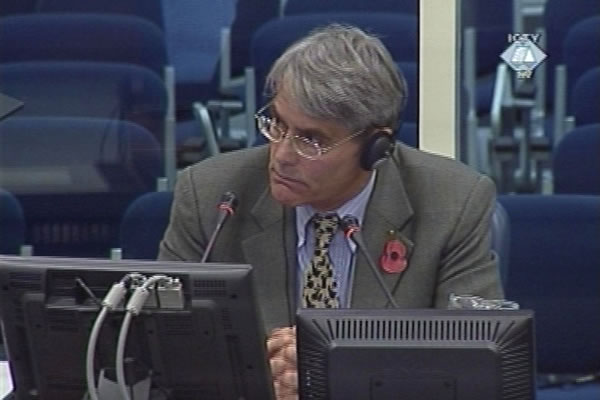Home
UNPROFOR USED AS ‘HOSTAGE AND SHIELD’
British general Rupert Smith, former UNPROFOR commander in BH, says that in early 1995 neither party in BH wanted peace. They both wanted to use the UN forces for their own goals
 Rupert Smith, witness in the trial of the former Bosnian Serb leaders charged with crimses in Srebrenica and Zepa
Rupert Smith, witness in the trial of the former Bosnian Serb leaders charged with crimses in Srebrenica and Zepa In his evidence at the trial of seven Bosnian Serb military and police officers, British general Rupert Smith says that neither party in BH wanted peace in early 1995. Smith was the UNPROFOR commander in BH at the time.
According to Smith, he found this to be the case in the field when he arrived in Sarajevo in January 1995. As time went by, his initial assessment was confirmed. In his view, the cease-fire agreement between the Federation and Bosnian Serbs that was in force at the time stood no chance.
It was ‘highly likely’, Smith said, that the Serb forces would exert pressure on the eastern UN-protected enclaves: Srebrenica, Zepa and Gorazde. The reason for this, in his view, is that the Bosniak side was growing weaker and the Serbs faced shortage of troops to hold vast swathes of territory under control.
The prosecutor showed the British general minutes from his meetings with the highest military and political leaders on the Serb and Bosniak sides. Between February and July 1995, Smith spoke several times with Karadzic, Mladic, Koljevic and Tolimir on the Serb side and with Izetbegovic, Silajdzic, Muratovic and Delic on the Bosniak side. Both tried to use the UN forces for their own goals, Smith concluded.
As the British general described it, it was a situation in which the UN forces were used both ‘as a hostage and a shield’. The Bosniaks saw the UN forces as a ‘convenient source of their own legitimization’. As for NATO, they saw it as a potential military ally. They saw the UN as a shield; the Serb forces, on the other hand, saw the UN troops as ‘hostages’ they could use to exert pressure on the international community.
There were ‘tensions’ between the Serb military and political leadership in Pale. The bone of contention was most probably whether to continue negotiations about the cease-fire agreement or launch new attacks, Smith believes. Despite the differences, both Bosnian Serb leaders – Mladic and Karadzic – demanded that the sanctions against Bosnian Serbs be lifted. At the same time, they accused UNPROFOR of supplying the BH Army forces in the enclaves with fuel and weapons.
As Smith recounted, Mladic threatened he would attack the enclaves because of that. At a meeting on 21 May 1995, Karadzic called the enclaves ‘time bombs about to explode’. He warned that they would ‘impose sanctions on the UN’, threatening the UN with a total blockade. If NATO targeted the Serb forces, he said, ‘the Serb forces will turn against the UN’ and treat it as the enemy.
Despite the threats, NATO forces were used in late May when the VRS continued shelling Sarajevo, Gorazde and Srebrenica despite repeated warnings. UN observation posts in those areas came under Serb fire. The objective of the NATO air strikes, the British general explained, was not so much to neutralize the Serb positions as to exert pressure on the Pale leadership to call a stop to the attacks.
General Rupert Smith’s testimony will continue tomorrow afternoon.
Linked Reports
- Case : Popovic et al. - "Srebrenica"
- 2007-04-27 PROOF “HANGING BY A THREAD”
- 2007-04-25 WHO WAS ON DUTY AT THE FORWARD COMMAND POST?
- 2007-04-24 INVESTIGATION OVER THE “FIGHTERS HELPING THE ENEMY”
- 2007-11-06 RUPERT SMITH: ‘BAD ASSESSMENT’ OF THE SREBRENICA SITUATION
- 2007-11-08 BRITISH GENERAL IN ‘MLADIC’S SHOES’
- 2007-11-09 BRITISH GENERAL’S ‘BIAS’
